Student Blog
Global Initiatives Team
My Experience in Creating the World OT Day Video for the USC Chan Division ⟩
November 29, 2021, by Global Initiatives Team
Diversity International Videos What are OS/OT?
By Kashvi Shah, Post-Professional Master’s student
Editors Michelle Plevack and Abraham Ramirez
Entry-Level Professional Master’s students
“Our sense of belonging can never be greater than our level of self-acceptance.” — Brené Brown.
At USC Chan, we have a diverse global community with a significant percentage of international students. Most of them struggle to find their sense of belonging in this new environment and find it challenging to develop resilience. However, “true belonging does not require you to change who you are: it requires you to be who you are” (Brené Brown).
Hence, on this World OT Day, I thought it would be a great idea to involve our student community in celebrating ourselves and our profession. I approached Dr. Daniel Park at the Global Initiatives office with the idea of creating a short video film of our students on the theme by WFOT (World Federation of Occupational Therapists): Belong, Be You. I am sure you began to wonder what these words mean to you. And so did I.
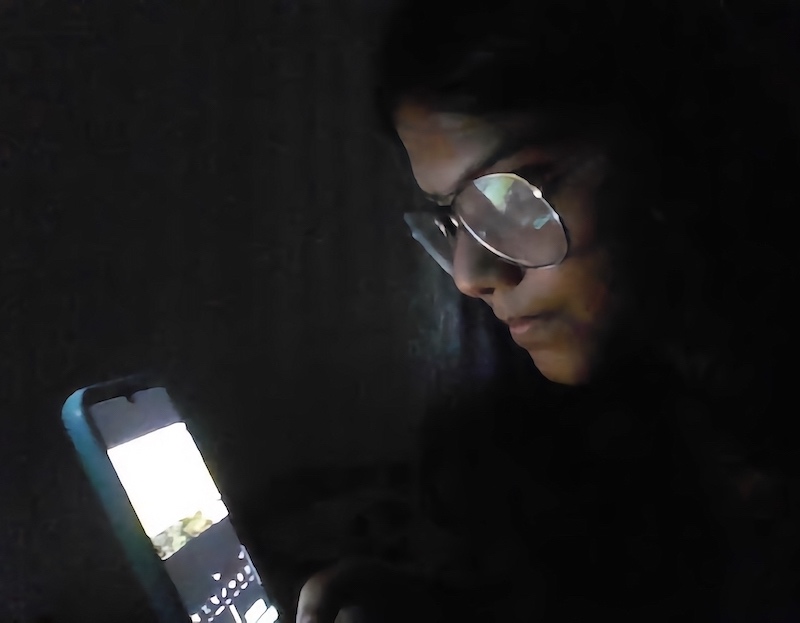
Kashvi in the process of World OT Day video editing
Earlier, I was excited about this project as I found an opportunity to contribute to this with my interest in videography and editing. However, soon after my excitement turned into anxiety. The technical aspects of videography then seemed less challenging than the conceptualization of this video, which was more entangled than expected.
Fortunately, I had the assistance of Marvyn Ngo, our MA-1 Student Ambassador at USC Chan, who always corroborated my ideas and furthermore, helped in reaching out to students for participation in the video.
The most exciting and enthralling part of this process began next, as it was finally time to put together what the participants had shared. Ann Beattie once said “People forget years and remember moments.” That is exactly what the video clips from our participants’ cherished moments were. They could feel their belonging in celebrating who they really are! I enjoy dancing as a meaningful occupation wholeheartedly and being myself is my true belonging. I was glad to see how all our participants found meaning in different activities.
For me this experience was so enriching. From facing the challenges of generating ideas to the support in executing them, and from the excitement of creation to the anxiety of outcome, it was indeed a whirlwind. For this opportunity, I am grateful to those at the Chan Division who added meaning to my belonging at USC.
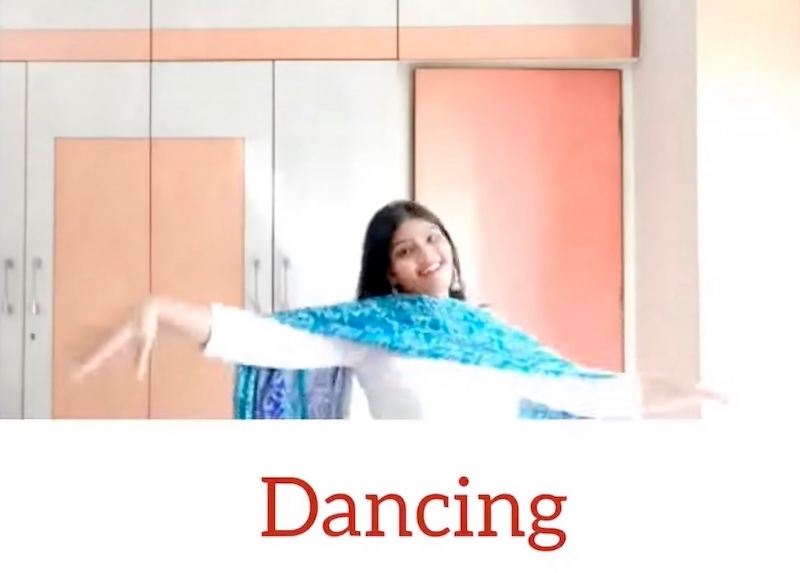
Kashvi enjoying dance, Being herself!
References
Brown, B. (2012). Daring greatly: How the courage to be vulnerable transforms the way we live, love, parent, and lead. New York, NY: Avery.
Brown, B. (2017). Braving the wilderness: The quest for true belonging and the courage to stand alone. New York, NY: Random House.
Beattie, A. (2002). Where you’ll find me and other stories. New York, NY: Scribner.
⋯
Reconnecting with my Filipino Roots at USC Chan ⟩
November 15, 2021, by Global Initiatives Team
By Abby Khou, Entry-Level Professional Master’s student and Global Initiatives volunteer
Editors Alison Chang and Vanessa ElShamy
Entry-Level Professional Master’s students
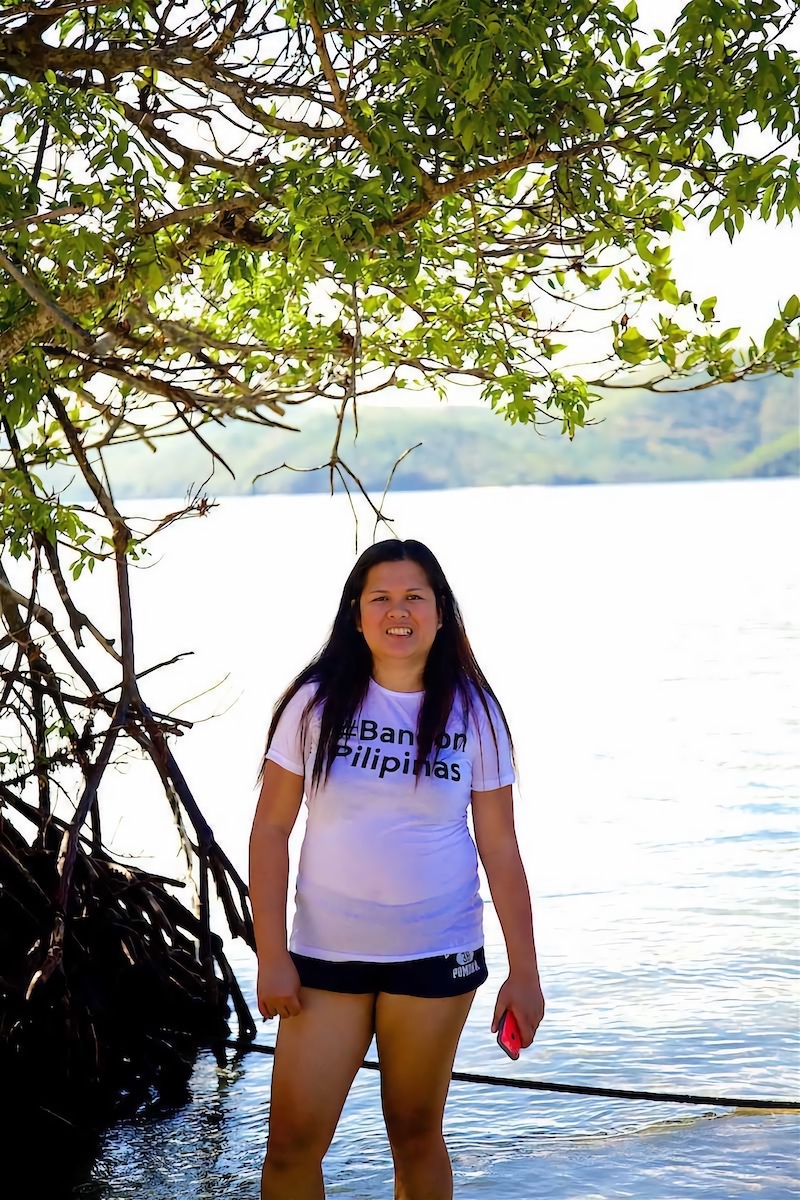
Abby’s visit to Palawan, Philippines
When I first came to the United States as a Filipino immigrant in 1999, I didn’t realize that one of the questions I would be asked the most is “are you a nurse?” While it is one of the popular Filipina stereotypes, it does hold some grain of truth — many Filipino men and women come to the US and either study nursing or work as nurses. In Filipino culture, healthcare workers are held in high regard. I would hear some of my family members boast of their children who work in the medical field or are the pride of their families because of their line of work. Why do Filipinos make such good healthcare workers? I may sound a tad bit biased — my mom is a nurse in Pennsylvania and my dad is a doctor in the Philippines! 😊 I believe that Filipinos are intuitively compassionate, caring, and selfless. They go out of their way to make other people feel comfortable, even when they’re sacrificing their own comfort.
It seems almost inevitable that I would end up pursuing a healthcare career, but I never thought it would be Occupational Therapy. I didn’t see myself as a nurse because I was always a bit anxious when I would get blood drawn. I only found out about OT 4 years ago because of my son’s Autism Spectrum Disorder (ASD) diagnosis. Being a big proponent of Early Intervention, I learned about OT as a parent sitting in on his OT sessions and conversing with his OTs in his Early Intervention program and outpatient pediatric clinic. His OTs made such a big impact in his growth and development that I decided I wanted to do for others what my son’s OTs had done for him. I had been working in public relations and marketing since 2007. In Manila, I was working at a TV network in 2001 and had no idea OT even existed. OT in the Philippines was at its infancy in 1917 when the Philippines’ government enacted the Revised Administrative code, which ensured that those who were injured while serving the government were compensated for ensuing disability and/or injury while serving. OT was introduced to the Philippine Civil Administration Unit I (PCAU I) General Hospital by Andre Roche, an OT of French origin. Similar to in the U.S., OT in the Philippines had its roots in the World War — the purpose of PCAU I was to care for Filipinos and Americans who were impacted by WWII.

Palawan, Philippines
Now in 2021, as a Filipino-American and non-traditional OT student who is pursuing the profession as a second career, I am grateful for the opportunity to connect with my Filipino roots at USC Chan. OT is quickly becoming a sought-after career in the Philippines, and I have met quite a number of Filipino international students pursuing their Post-Professional MA degrees in OT. Two kababayans (fellow Filipinos) were my instructors as OTD residents in the summer and fall. One great interaction I had was with Jerzl Awit, who is the OTD resident for our Quantitative Research class. I attended her workshop for my Literature Search paper and connected with her during the session because we both speak Tagalog (the primary Filipino language). I also met Nicole Parcon, an MA-1 student from the 2021 SOTI Program and exchanged emails with her after we met on Zoom. Now, she is a friendly face that I often bump into and chat with on campus. The sound of Tagalog in the hallways of USC Chan always brings me back home, and the connections I have already made feel like the comfort of warm sabaw (soup) on a cold, rainy day. I am proud of my Filipino colleagues who passionately pursue their OT degrees at USC Chan as part of their journey to becoming an OT practitioner.
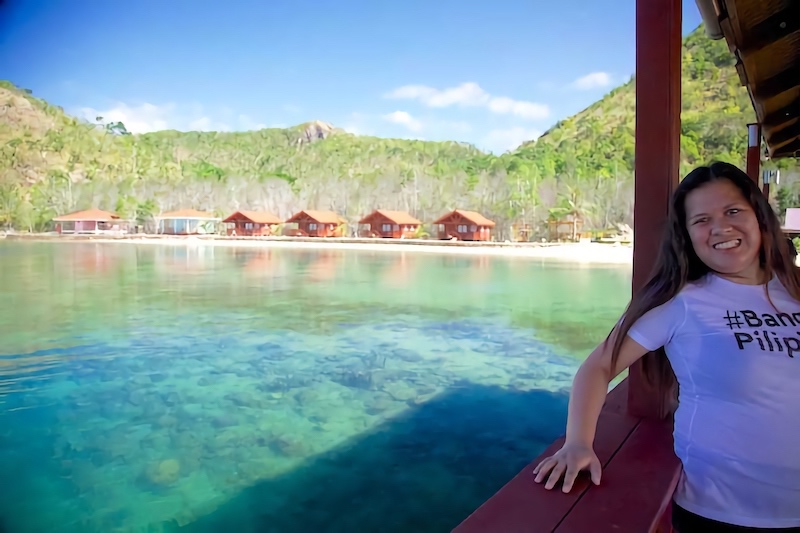
Abby’s visit to Palawan, Philippines
⋯
A Turning Point of My Life: From PKUHSC to USC ⟩
October 22, 2021, by Global Initiatives Team
Classes Fieldwork International What are OS/OT?
By Chen Gong, OTD
Editors Michelle Plevack and Abraham Ramirez
Entry-Level Professional Master’s students
What made you interested in occupational therapy?
My story with occupational therapy began in 2018 when I was an intern therapist in the Department of Rehabilitation Medicine at The Sixth Affiliated Hospital of Sun Yat-sen University in Guangzhou. As a beginner in OT, I attached importance to function-oriented treatment. However, my instructor encouraged me that I should pay more attention to the patient’s real life. Once, on a whim, I used a guitar to engage a patient with dementia in a music activity. The patient was relieved from the tiredness and boredom of previous therapy sessions. I could see tears in her eyes that this activity was meaningful to her. This incident has completely changed my opinion about OT, and let me really understand the meaning of occupation. Later, because of my love for OT, I came to the dual-degree OT program between Peking University Health Science Center (PKUHSC) and USC to continue my studies as an OTD student.
Why did you choose to continue your education with the OTD?
During my two years at PKUHSC, I gained a more systematic understanding of OT theoretical knowledge and gradually found the current situation of OT promotion in China. In many general hospitals, OTs have not found their own optimal practice area. OTs are unable to establish their professional identity and carry out meaningful acts of therapy. I deeply feel the inadequacy of my own ability. I look forward to further improving my professional level and leadership, exploring the OT market, and leading the development of OT in China in the future. I believe that studying at USC Chan will help me to achieve my goals.
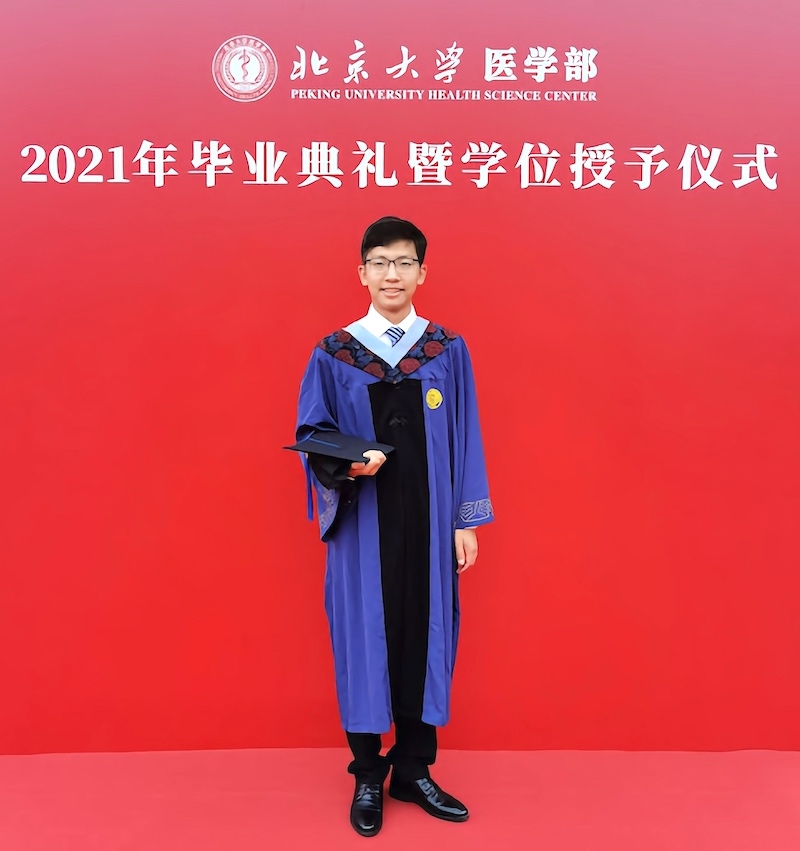
Master’s degree ceremony: Peking University, Beijing, China, Summer 2021
How has the transition from MSc in PKUHSC to OTD been?
China and the United States have very different cultural backgrounds. This ranges from the perspective of OT education, the way of communication between people, the atmosphere of class and work, and the pace of life here are all different from before. It has basically been like learning how to grow up and live again. Fortunately, I quickly adapted to the lifestyle and study context here. For the first semester, I am working with Dr. Emily Sopkin and Dr. Shawn Roll separately for pedagogy and research. Now I can actively act as a mentee.
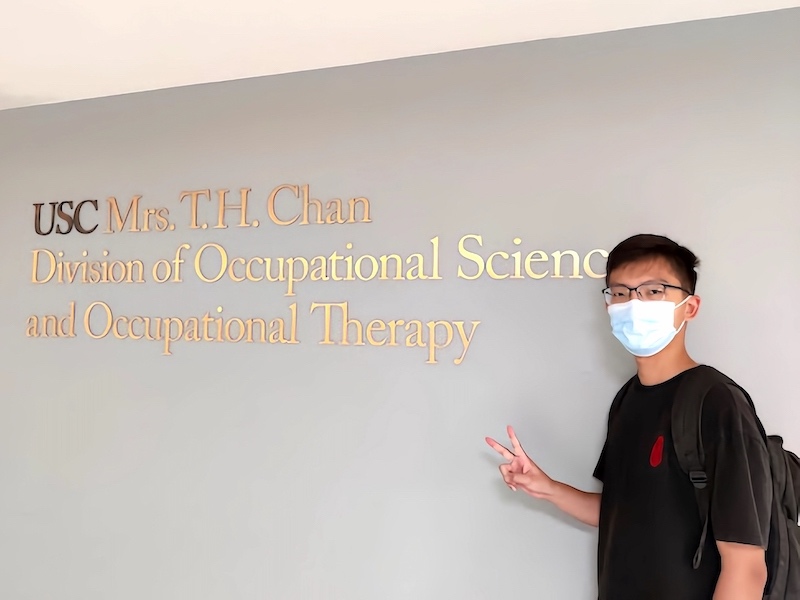
Chen’s First photo with USC Chan Division, Fall 2021
Describe your experience of OT school at PKUHSC vs USC.
Studying OT in PKUHSC for two years was really a very good experience. We completed the Master’s courses required by USC, and the way of teaching at PKUHSC was similar to USC Chan’s classes. In addition to the courses, we all completed a certain research project and published a paper in Chinese core journals. Through this, I have special appreciation for my mentor, Professor Ninghua Wang and her support for my research work. I also really appreciate my instructors Dr. Jane Liu, Dr. Liguo Qian, Dr. Hui Wang, Dr. Lily Xu and Dr. Buwen Yao, who were all students of USC Chan, and their efforts to localize these OT courses. Studying OT at USC is exciting. I can feel leadership everywhere. This immersion allowed me to think about how to develop my leadership. The Chan Division has its own unique experience in pedagogy, research, and clinical practice. I am sure I can learn something different from what I learned in PKUHSC, especially in clinical practice.
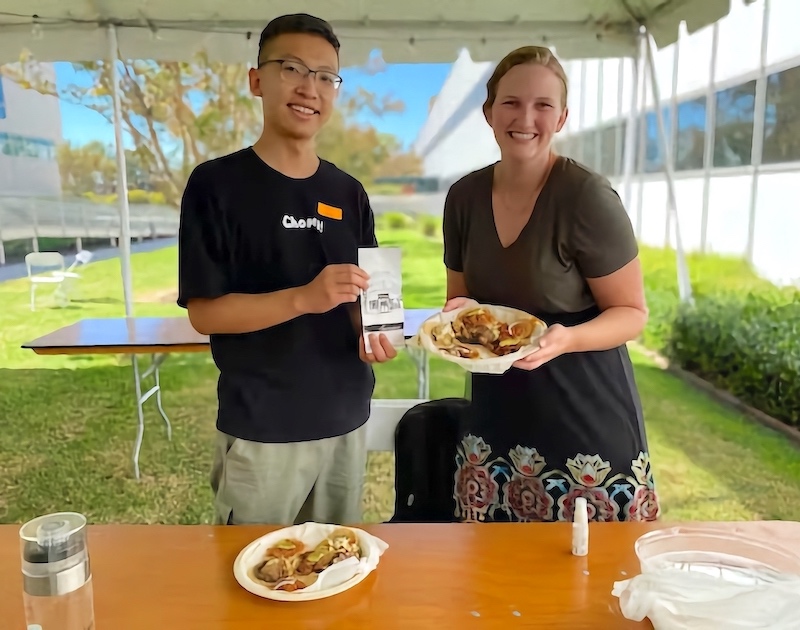
Unforgettable lunch with Dr. Emily Sopkin, Fall 2021
What do you think about your OTD residency so far?
It’s great! My residency for the first semester is mainly about pedagogy and research.
For my pedagogy residency I am a teaching assistant for OT 440: Kinesiology, which was also my favorite class when I was a Master’s student at PKUHSC. I enjoy this job. I developed a good mentoring relationship with Dr. Sopkin. I try to be creative by sharing knowledge related to the course with my students to help them learn from different perspectives.
For research, I’m working in the Musculoskeletal Sonography and Occupational Performance (MSOP) laboratory. Now I am gradually getting involved in existing research in the lab, which makes me feel fulfilled. As Dr. Roll said, “I don’t think it’s that important for you to learn a particular skill. It’s more important to immerse yourself in the research environment and see how research works.” I couldn’t agree more.
What kind of OT do you want to be in the future? Your plans/goals after OTD graduation? Or how will you promote OT services in China?
Actually, I want to be an active OT, who is purposeful, has great leadership skills and knows how to promote OT effectively. I also hope that I will be good at several clinical skills, which will help me establish my professional identity.
I plan to work in the OT department of a general hospital, mainly engaged in the occupational therapy of musculoskeletal and neurological disorders of the upper limbs and hands, and also undertake part of the teaching work, e.g. combining what I learned here with China’s clinical context and then trying to establish a practical framework of occupation-based hand therapy education. As for research, I will try to design and lead research projects and apply for national funding.
⋯
Perspectives of a Post-Professional MA to OTD Student: Amy Yeu ⟩
September 29, 2021, by Global Initiatives Team
Classes Externships International
Su-Min (Amy) Yeu, OTD
By Michelle Plevack
Entry-Level Professional Master’s student
In collaboration with Maggie Chen and Prutha Satpute
Global Initiatives OTDs
Editors Alison Chang, Vanessa Elshamy, and Brittany Inouye
Entry-Level Professional Master’s students
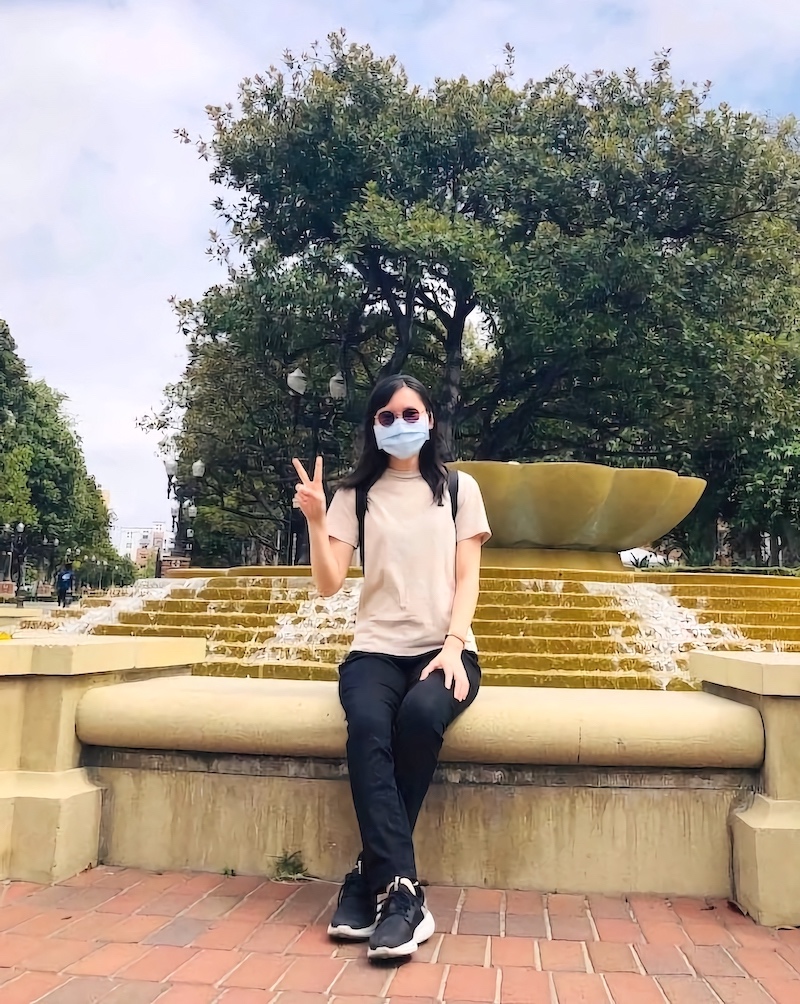
First photo Amy took at USC — OTD, Fall 2021
Global Initiatives OTD Maggie Chen had the opportunity to interview international student, Su-Min (Amy) Yeu. Michelle Plevack wrote this blog with the purpose of sharing Amy’s perspectives of her transition from USC’s Post-Professional Master’s Program to the Post-Professional Doctorate of Occupational Therapy (OTD) Program.
What are some of the factors that influenced your decision to continue your education with the OTD?
Amy: I considered professional, personal, and program aspects. Professionally, I thought about my future career and my goals. As an international student, I thought about what I was interested in but could not learn in my hometown. For example, I know that OT in the United States focuses on health promotion, an area I am interested in. I also thought about the timeline and pathway that I am going to take in the future. For example, when am I going to do the OTD and how long is the program going to be?
Personally, I hope to return to Taiwan. I also thought: if I am not going to do the OTD, then what am I going to do? Am I going to work in the US or am I going back to Taiwan? I also thought about the difference if I did not have the degree: is it only because I want to earn another credential, or is there anything else that is important to me? Another thing I considered was employment, of course. Like many students, I have concerns about paying tuition and looked into residencies that might offer a scholarship or stipend for me. As far as personal goals, it was important for me to travel abroad and to gain new experiences in the US.
Considering programs, I was interested in non-traditional tracks that focus on health and wellness and international relationships. I know at USC they have clinical, research, administration, and pedagogy tracks. I ended up being placed with the Kortschak Center for Learning and Creativity (KCLC — clinical track) at USC which I am very grateful for, and I know at USC, I can choose to have a subspecialty — in research, for example — that could contribute to my career goals.
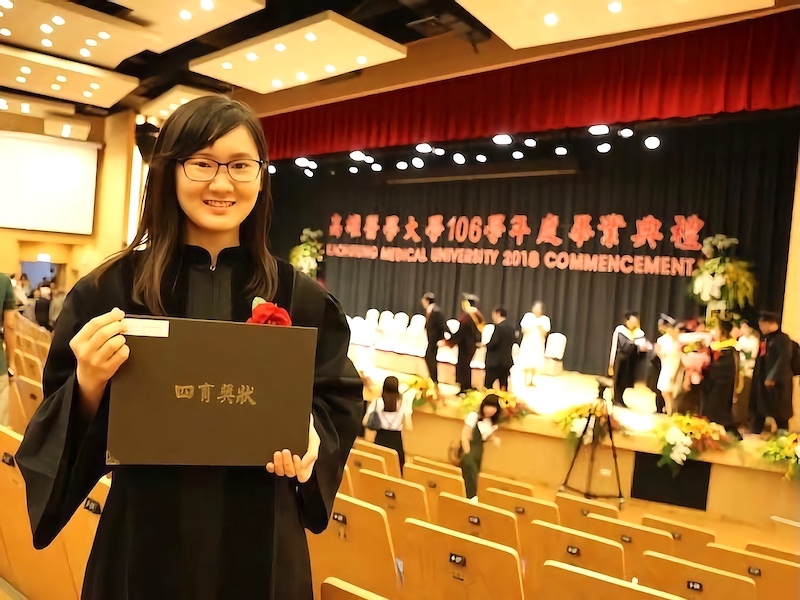
Commencement: Kaohsiung Medical University; Kaohsiung, Taiwan — Senior, 2018
What goals have you set for yourself during your OTD? Why is the OTD beneficial to your future goals and career?
Amy: I want to network and build relationships within the USC community and improve my clinical skills by utilizing my therapeutic use of self, motivational interviewing, and evidence-based knowledge. With these skills, I can not only provide services appropriately, efficiently, and holistically to all students, but also appropriately refer students to other services. As I know these services are not currently popular in Taiwan, I hope to show the efficacy of the services at KCLC by conveying the unique roles and skills of occupational therapy and academic coaching services in universities. My future goal is to improve the quality of life of university students in Taiwan, particularly as a result of the COVID-19 pandemic, by implementing and developing novel ideas into on campus services. I believe having a doctorate level of education at international conferences will allow me to effectively advocate for essential services and pioneer the roles of OTs working in universities.
How has the transition from Post-Professional MA to OTD been?
Amy: This transition looks different depending on what track you are taking. For my clinical track, I spend most of my time in my residency at 20 or 40 hours a week. Compared to being an Post-Professional MA student, your role changes as an OTD student, as you are ‘in the driver’s seat’ where you need to be self-directed, proactive, and create your own structure to support your goals. However, because I am more settled into my role after the MA program, I feel less anxious and confused, and even excited about my coursework. Consequently, compared to being an MA student, there are fewer social opportunities with peers due to the nature of the coursework for the OTD program.
What has been the best and hardest part of the OTD so far?
Amy: The best part is my residency — I feel like I am seeing the endless possibilities of occupational therapy. There have been so many opportunities during the process of integrating my knowledge, experiences, and passions in a way where I am ‘learning by doing’. I get to wake up excitedly, not only because of schoolwork, but also because I am pursuing my dreams while collaborating with people who share the same goals, values, and beliefs. Some difficult aspects of the OTD for me as an international student are the language and cultural barriers, particularly while sharing thoughts. I am still figuring out how to provide services and express my perspectives with the KCLC team in an effective and efficient manner. Due to the cultural differences between myself, clients, and peers, I am also not always familiar with a place or experience they might reference to. Finally, learning to be more flexible due to the uncertainties of the pandemic, such as adjusting to hybrid services, has been a challenging transition as well.
How have you been balancing leisure and personal time with OTD responsibilities?
Amy: I try to be patient and kind to myself. Luckily, I work in a residency that promotes the importance of work-life balance and recommends us to not bring work home. I also try to focus on self-care activities, setting up short breaks, making time for myself, journaling, having snacks, listening to music, catching up with family, and socializing with friends on weekends.
What advice would you give to students about the OTD?
Amy: For those indecisive about the OTD, I would recommend connecting with professors, residents, and other peers who are interested in discussing the OTD. In my experience as a MA student, it can be hard to decide one month into the program if the OTD is right for you. And even though I am very satisfied with my residency, I regret not applying to even more sites! Remember that post-graduation, you do not need to stick to whatever you do for your OTD. If you are planning on doing the OTD, consider what you want to get out of this program. You won’t regret it! Keep dreaming big! Jot down your thoughts, journal, and think deeper. Remember there are no restrictions with what you can do with an OT background. Consider being open to roles or positions not necessarily called OT if they relate to your passions.
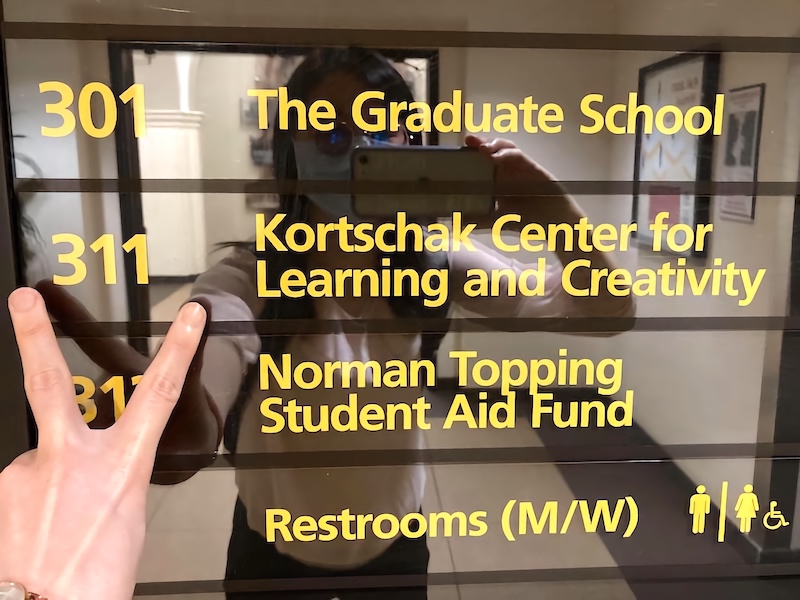
Amy’s residency: USC Kortschak Center for Learning and Creativity; Los Angeles — OTD, 2021
⋯
Externship project — The experience of spiritual participation among people with intellectual disabilities in an evangelical church in Hong Kong ⟩
September 15, 2021, by Global Initiatives Team
Diversity Externships International
By Rebecca Ka Ki Tam
Post-Professional Master’s student
This externship project was inspired by the concept of occupational justice. I worked as a pediatric occupational therapist in preschool settings in Hong Kong before studying at USC. During those days, I had little knowledge about occupational justice. My studies at USC have expanded my understanding of occupational justice and greatly inspired my belief that occupational therapists can advocate for everyone’s right to participate in everyday occupations regardless of age, ability, gender, social class, or other differences (American Occupational Therapy Association, 2020; Nilsson & Townsend, 2010, p. 58). This concept has allowed me to reflect on my experience volunteering in a church in Hong Kong that pioneered spiritual participation among people with intellectual disabilities (ID). I experienced the joy among people with intellectual disabilities in their Sunday services. I wondered, however, whether spirituality is vital to their well-being. This population is one of the most controversial populations to serve in churches since many people believe that individuals with ID cannot fully understand the concept of faith. Thus, I became curious to know more about spirituality in this population — what is their experience in this occupation? How important is faith among people with ID? As revealed in my full article, I started this externship project to explore spiritual participation among people with intellectual disabilities. I conducted interviews in a church that pioneered spiritual participation among people with intellectual disabilities in Hong Kong. I interviewed a participant with severe ID, the participant’s caregiver, a volunteer, and two pastors. I also interviewed Professor Sarah Shea, who is involved in research relating to practical theology and theologies of disabilities and who ministered to marginalized populations at Hong Kong Baptist Theological Seminary.
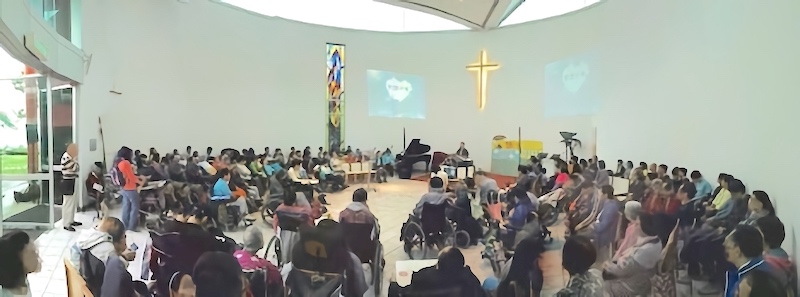
Participants were participating a Sunday Service in an evangelical church that pioneered the facilitation of spiritual participation among people with intellectual disabilities in Hong Kong
One memorable experience during this project was my interview with Anna (pseudonym), who has a severe ID. During the interview, she prayed for me, sang me a gospel song, and joyfully asked me to accompany her to church. Anna revealed how much she loves church life. I was very touched by her warm welcome and explicit love. Her caregiver shared with me that spiritual activities were unique in that they have helped Anna understand more about life and death, and overcome loneliness.
Anna initially was not comfortable talking to me during the interview. At first, she frequently walked away and ignored my questions. I then tried to talk in simple sentences and treated her as a friend. She gradually became more relaxed, sat down, and chatted with me. It reminded me of a pastor’s sharing that it is always important to be “present” — “Take your time, no rush. Be there with them, despite their circumstances, and treat them genuinely as true friends.”
In this project, I further reflected on how the arbitrary binary of “typical” or “atypical” classifications has inevitably become a barrier to genuine communication. Despite differences, we can always treat each other as true friends, learn from each other, and accept support and help from each other. I used to have a misconception that people with different intelligence might have different needs. Thus, it might be suitable to segregate people into various groups according to their needs. However, I realized this misconception was a barrier that had obstructed my genuine interaction and friendship with people diagnosed with intellectual disability. There should not be hierarchies in interaction, but we should celebrate our diversity. In an interview, a pastor shared that occupational justice probably does not merely focus on enabling people to participate in a particular occupation but also emphasizes the meaningful interaction among different people within that context. I envision that the concept of occupational justice will be more widespread someday, and I hope this article will motivate the public to advocate for occupational justice among people with intellectual disabilities.
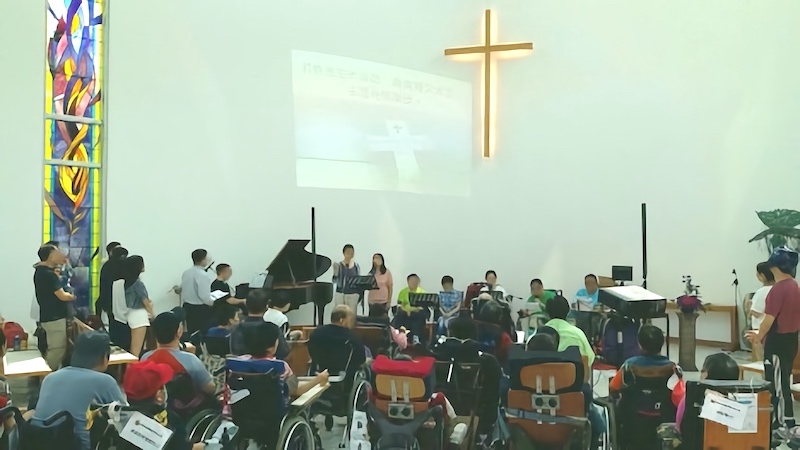
Participants, no matter with disabilities or not, were leading worship
References
American Occupational Therapy Association. (2020). Occupational therapy practice framework: Domain and process (4th ed.). American Journal of Occupational Therapy, 68(Suppl. 1). S1-S48.
Nilsson, I., & Townsend, E. (2010). Occupational justice — Bridging theory and practice. Scandinavian Journal of Occupational Therapy, 17, 57–63. https://doi.org/10.3109/11038120903287182
Tam, R. K. K. (2021, July 15). The experience of spiritual participation among people with intellectual disabilities in an evangelical church in Hong Kong
⋯





